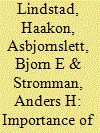| Srl | Item |
| 1 |
ID:
112919


|
|
|
|
|
| Publication |
2012.
|
| Summary/Abstract |
CO2 emissions from maritime transport represent 3.3% of the world's total CO2 emissions and are forecast to increase by 150%-250% by 2050, due to increased freight volumes (Second IMO GHG study, 2009). Fulfilling anticipated climate requirements (IPCC, 2007) could require the sector to reduce emissions per freight unit by a factor of five or six. The International Maritime Organization (IMO) is currently debating technical, operational and market-based measures for reducing greenhouse gas emissions from shipping. This paper also investigates the effects of economies of scale on the direct emissions and costs of maritime transport. We compared emissions from the current fleet (2007), with what can be achieved by increasing average vessel size. The comparison is based on the 2007 levels of trade and predictions for 2050. The results show that emissions can be reduced by up to 30% at a negative abatement cost per ton of CO2 by replacing the existing fleet with larger vessels. Replacing the whole fleet might take as long as 25 years, so the reduction in emissions will be achieved gradually as the current fleet is renewed.
|
|
|
|
|
|
|
|
|
|
|
|
|
|
|
|
| 2 |
ID:
099282


|
|
|
|
|
| Publication |
2010.
|
| Summary/Abstract |
The objective of this study is to evaluate a select set of financial incentive instruments that can be employed by the Norwegian government for encouraging early investment and production experience in wood-based Fischer-Tropsch diesel (FTD) technologies as a means to accelerate reductions in greenhouse gas emissions (GHG) stemming from road-based transport. We start by performing an economic analysis of FTD produced from Norwegian forest biomass at a pioneer commercial plant in Norway, followed with a cost growth analysis to estimate production costs after uncertainty in early plant performance and capital cost estimates are considered. Results after the cost growth analysis imply that the initial production cost estimates for a pioneer producer may be underestimated by up to 30%. Using the revised estimate we then assess, through scenarios, how various financial support mechanisms designed to encourage near-term investment would affect production costs over a range of uncertain future oil prices. For all policy scenarios considered, we evaluate trade-offs between the levels of public expenditure, or subsidy, and private investor profitability. When considering the net present value of the subsidy required to incentivize commercial investment during a future of low oil prices, we find that GHG mitigation via wood-FTD is likely to be considered cost-ineffective. However, should the government expect that mean oil prices in the coming two decades will hover between $97 and 127/bbl, all the incentive policies considered would likely spur investment at net present values =$-100/tonne-fossil-CO2-equivalent avoided.
|
|
|
|
|
|
|
|
|
|
|
|
|
|
|
|